Essay on the Need for a Bill of Rights in Australian Politics
VerifiedAdded on 2023/01/16
|10
|2756
|59
Essay
AI Summary
This essay provides a comprehensive analysis of the debate surrounding the implementation of a Bill of Rights in Australia. It begins by defining a Bill of Rights and its significance in protecting citizens' fundamental rights, contrasting entrenched and unfixed models. The essay explores the historical context, noting that Australia is unique among liberal democracies in not having a Bill of Rights. It then presents arguments both for and against the adoption of such a document, including an examination of existing protections within the Australian Constitution, relevant legislation, and common law principles. The author argues that Australia does not need a Bill of Rights as they have been sufficiently protected, addressing counterarguments and considering the potential impacts of a Bill of Rights on the balance of power between the parliament and the judiciary. The essay concludes that while the existing legal framework offers adequate protection, the debate is ongoing, and the need for a Bill of Rights remains a subject of discussion.
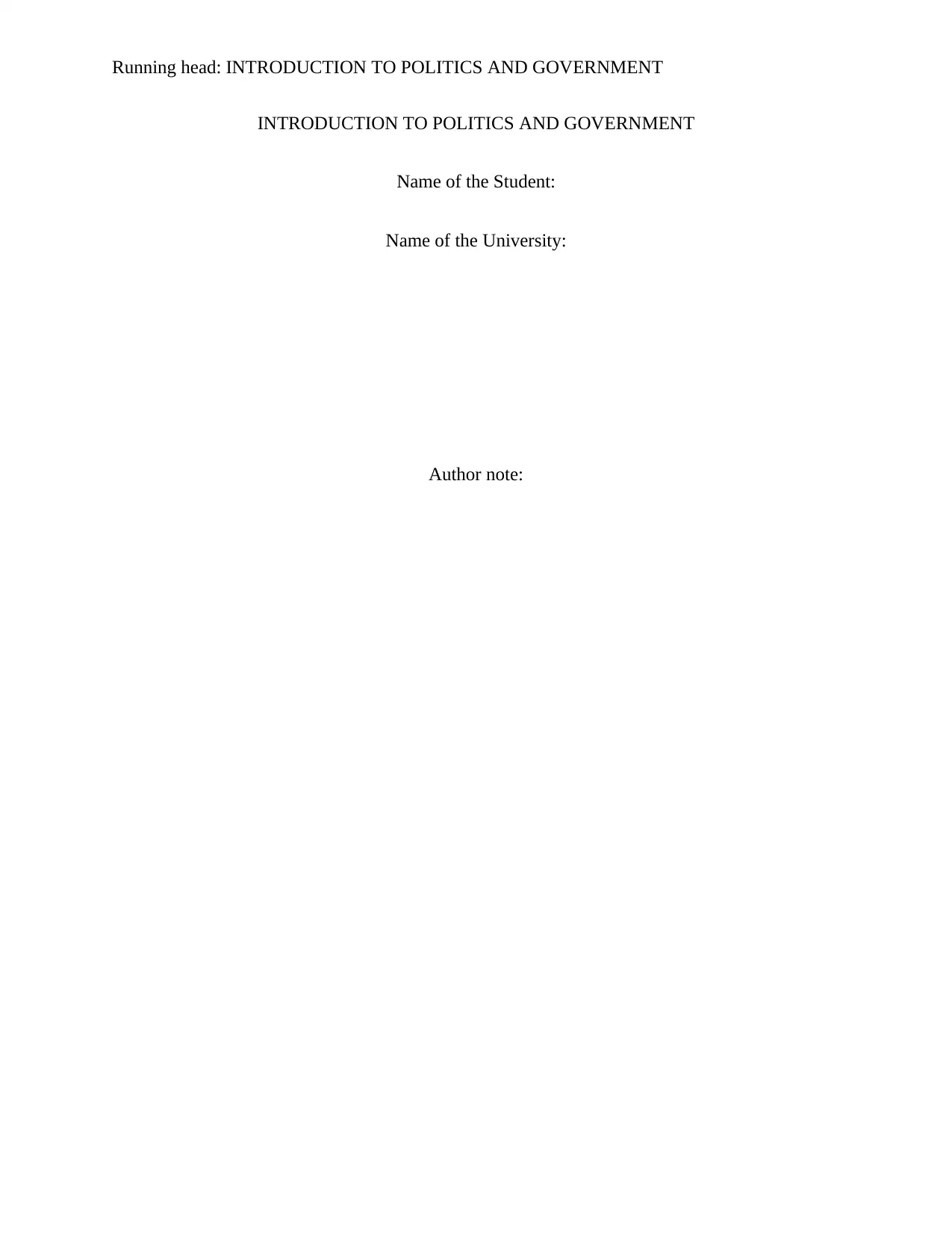
Running head: INTRODUCTION TO POLITICS AND GOVERNMENT
INTRODUCTION TO POLITICS AND GOVERNMENT
Name of the Student:
Name of the University:
Author note:
INTRODUCTION TO POLITICS AND GOVERNMENT
Name of the Student:
Name of the University:
Author note:
Paraphrase This Document
Need a fresh take? Get an instant paraphrase of this document with our AI Paraphraser
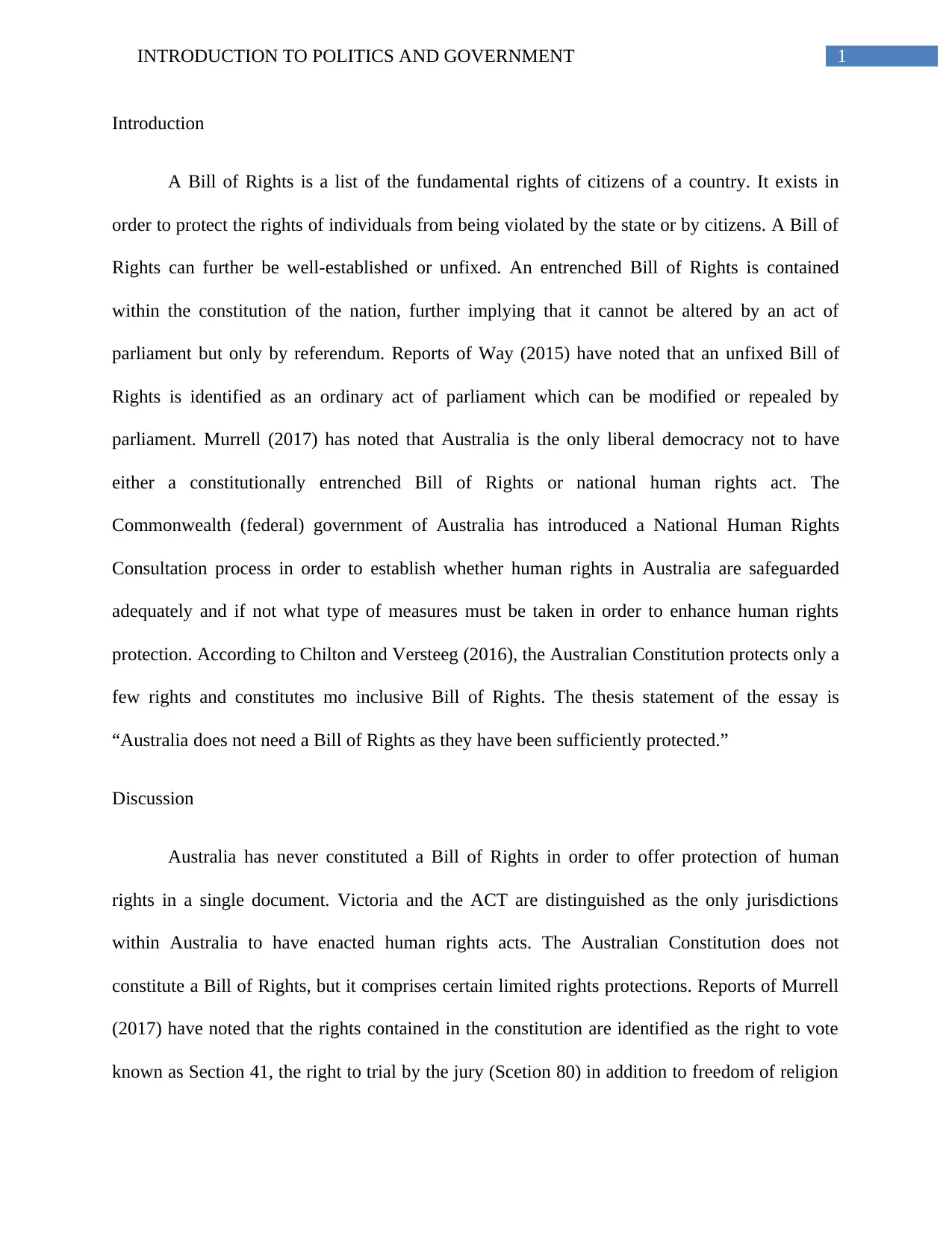
1INTRODUCTION TO POLITICS AND GOVERNMENT
Introduction
A Bill of Rights is a list of the fundamental rights of citizens of a country. It exists in
order to protect the rights of individuals from being violated by the state or by citizens. A Bill of
Rights can further be well-established or unfixed. An entrenched Bill of Rights is contained
within the constitution of the nation, further implying that it cannot be altered by an act of
parliament but only by referendum. Reports of Way (2015) have noted that an unfixed Bill of
Rights is identified as an ordinary act of parliament which can be modified or repealed by
parliament. Murrell (2017) has noted that Australia is the only liberal democracy not to have
either a constitutionally entrenched Bill of Rights or national human rights act. The
Commonwealth (federal) government of Australia has introduced a National Human Rights
Consultation process in order to establish whether human rights in Australia are safeguarded
adequately and if not what type of measures must be taken in order to enhance human rights
protection. According to Chilton and Versteeg (2016), the Australian Constitution protects only a
few rights and constitutes mo inclusive Bill of Rights. The thesis statement of the essay is
“Australia does not need a Bill of Rights as they have been sufficiently protected.”
Discussion
Australia has never constituted a Bill of Rights in order to offer protection of human
rights in a single document. Victoria and the ACT are distinguished as the only jurisdictions
within Australia to have enacted human rights acts. The Australian Constitution does not
constitute a Bill of Rights, but it comprises certain limited rights protections. Reports of Murrell
(2017) have noted that the rights contained in the constitution are identified as the right to vote
known as Section 41, the right to trial by the jury (Scetion 80) in addition to freedom of religion
Introduction
A Bill of Rights is a list of the fundamental rights of citizens of a country. It exists in
order to protect the rights of individuals from being violated by the state or by citizens. A Bill of
Rights can further be well-established or unfixed. An entrenched Bill of Rights is contained
within the constitution of the nation, further implying that it cannot be altered by an act of
parliament but only by referendum. Reports of Way (2015) have noted that an unfixed Bill of
Rights is identified as an ordinary act of parliament which can be modified or repealed by
parliament. Murrell (2017) has noted that Australia is the only liberal democracy not to have
either a constitutionally entrenched Bill of Rights or national human rights act. The
Commonwealth (federal) government of Australia has introduced a National Human Rights
Consultation process in order to establish whether human rights in Australia are safeguarded
adequately and if not what type of measures must be taken in order to enhance human rights
protection. According to Chilton and Versteeg (2016), the Australian Constitution protects only a
few rights and constitutes mo inclusive Bill of Rights. The thesis statement of the essay is
“Australia does not need a Bill of Rights as they have been sufficiently protected.”
Discussion
Australia has never constituted a Bill of Rights in order to offer protection of human
rights in a single document. Victoria and the ACT are distinguished as the only jurisdictions
within Australia to have enacted human rights acts. The Australian Constitution does not
constitute a Bill of Rights, but it comprises certain limited rights protections. Reports of Murrell
(2017) have noted that the rights contained in the constitution are identified as the right to vote
known as Section 41, the right to trial by the jury (Scetion 80) in addition to freedom of religion
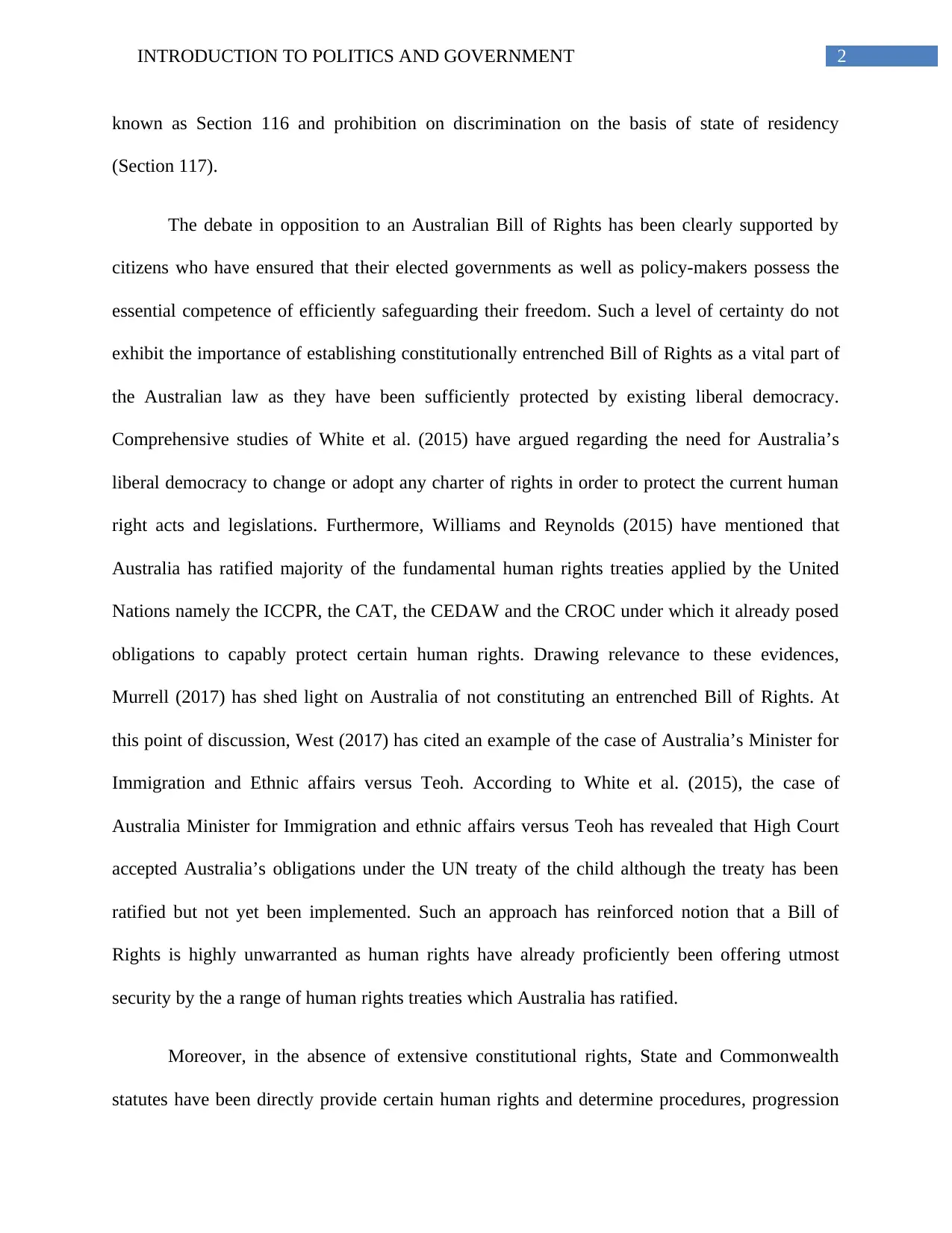
2INTRODUCTION TO POLITICS AND GOVERNMENT
known as Section 116 and prohibition on discrimination on the basis of state of residency
(Section 117).
The debate in opposition to an Australian Bill of Rights has been clearly supported by
citizens who have ensured that their elected governments as well as policy-makers possess the
essential competence of efficiently safeguarding their freedom. Such a level of certainty do not
exhibit the importance of establishing constitutionally entrenched Bill of Rights as a vital part of
the Australian law as they have been sufficiently protected by existing liberal democracy.
Comprehensive studies of White et al. (2015) have argued regarding the need for Australia’s
liberal democracy to change or adopt any charter of rights in order to protect the current human
right acts and legislations. Furthermore, Williams and Reynolds (2015) have mentioned that
Australia has ratified majority of the fundamental human rights treaties applied by the United
Nations namely the ICCPR, the CAT, the CEDAW and the CROC under which it already posed
obligations to capably protect certain human rights. Drawing relevance to these evidences,
Murrell (2017) has shed light on Australia of not constituting an entrenched Bill of Rights. At
this point of discussion, West (2017) has cited an example of the case of Australia’s Minister for
Immigration and Ethnic affairs versus Teoh. According to White et al. (2015), the case of
Australia Minister for Immigration and ethnic affairs versus Teoh has revealed that High Court
accepted Australia’s obligations under the UN treaty of the child although the treaty has been
ratified but not yet been implemented. Such an approach has reinforced notion that a Bill of
Rights is highly unwarranted as human rights have already proficiently been offering utmost
security by the a range of human rights treaties which Australia has ratified.
Moreover, in the absence of extensive constitutional rights, State and Commonwealth
statutes have been directly provide certain human rights and determine procedures, progression
known as Section 116 and prohibition on discrimination on the basis of state of residency
(Section 117).
The debate in opposition to an Australian Bill of Rights has been clearly supported by
citizens who have ensured that their elected governments as well as policy-makers possess the
essential competence of efficiently safeguarding their freedom. Such a level of certainty do not
exhibit the importance of establishing constitutionally entrenched Bill of Rights as a vital part of
the Australian law as they have been sufficiently protected by existing liberal democracy.
Comprehensive studies of White et al. (2015) have argued regarding the need for Australia’s
liberal democracy to change or adopt any charter of rights in order to protect the current human
right acts and legislations. Furthermore, Williams and Reynolds (2015) have mentioned that
Australia has ratified majority of the fundamental human rights treaties applied by the United
Nations namely the ICCPR, the CAT, the CEDAW and the CROC under which it already posed
obligations to capably protect certain human rights. Drawing relevance to these evidences,
Murrell (2017) has shed light on Australia of not constituting an entrenched Bill of Rights. At
this point of discussion, West (2017) has cited an example of the case of Australia’s Minister for
Immigration and Ethnic affairs versus Teoh. According to White et al. (2015), the case of
Australia Minister for Immigration and ethnic affairs versus Teoh has revealed that High Court
accepted Australia’s obligations under the UN treaty of the child although the treaty has been
ratified but not yet been implemented. Such an approach has reinforced notion that a Bill of
Rights is highly unwarranted as human rights have already proficiently been offering utmost
security by the a range of human rights treaties which Australia has ratified.
Moreover, in the absence of extensive constitutional rights, State and Commonwealth
statutes have been directly provide certain human rights and determine procedures, progression
⊘ This is a preview!⊘
Do you want full access?
Subscribe today to unlock all pages.

Trusted by 1+ million students worldwide
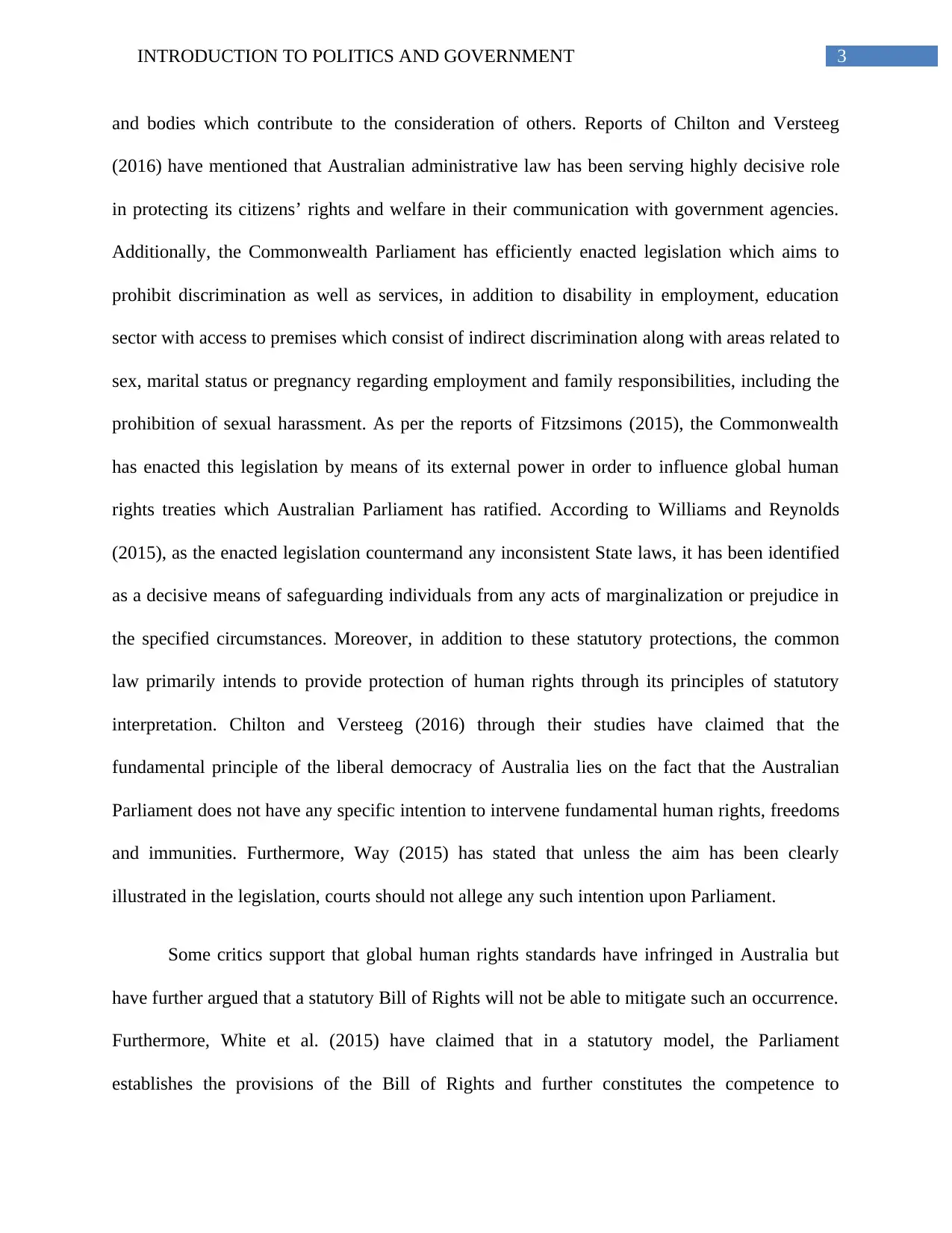
3INTRODUCTION TO POLITICS AND GOVERNMENT
and bodies which contribute to the consideration of others. Reports of Chilton and Versteeg
(2016) have mentioned that Australian administrative law has been serving highly decisive role
in protecting its citizens’ rights and welfare in their communication with government agencies.
Additionally, the Commonwealth Parliament has efficiently enacted legislation which aims to
prohibit discrimination as well as services, in addition to disability in employment, education
sector with access to premises which consist of indirect discrimination along with areas related to
sex, marital status or pregnancy regarding employment and family responsibilities, including the
prohibition of sexual harassment. As per the reports of Fitzsimons (2015), the Commonwealth
has enacted this legislation by means of its external power in order to influence global human
rights treaties which Australian Parliament has ratified. According to Williams and Reynolds
(2015), as the enacted legislation countermand any inconsistent State laws, it has been identified
as a decisive means of safeguarding individuals from any acts of marginalization or prejudice in
the specified circumstances. Moreover, in addition to these statutory protections, the common
law primarily intends to provide protection of human rights through its principles of statutory
interpretation. Chilton and Versteeg (2016) through their studies have claimed that the
fundamental principle of the liberal democracy of Australia lies on the fact that the Australian
Parliament does not have any specific intention to intervene fundamental human rights, freedoms
and immunities. Furthermore, Way (2015) has stated that unless the aim has been clearly
illustrated in the legislation, courts should not allege any such intention upon Parliament.
Some critics support that global human rights standards have infringed in Australia but
have further argued that a statutory Bill of Rights will not be able to mitigate such an occurrence.
Furthermore, White et al. (2015) have claimed that in a statutory model, the Parliament
establishes the provisions of the Bill of Rights and further constitutes the competence to
and bodies which contribute to the consideration of others. Reports of Chilton and Versteeg
(2016) have mentioned that Australian administrative law has been serving highly decisive role
in protecting its citizens’ rights and welfare in their communication with government agencies.
Additionally, the Commonwealth Parliament has efficiently enacted legislation which aims to
prohibit discrimination as well as services, in addition to disability in employment, education
sector with access to premises which consist of indirect discrimination along with areas related to
sex, marital status or pregnancy regarding employment and family responsibilities, including the
prohibition of sexual harassment. As per the reports of Fitzsimons (2015), the Commonwealth
has enacted this legislation by means of its external power in order to influence global human
rights treaties which Australian Parliament has ratified. According to Williams and Reynolds
(2015), as the enacted legislation countermand any inconsistent State laws, it has been identified
as a decisive means of safeguarding individuals from any acts of marginalization or prejudice in
the specified circumstances. Moreover, in addition to these statutory protections, the common
law primarily intends to provide protection of human rights through its principles of statutory
interpretation. Chilton and Versteeg (2016) through their studies have claimed that the
fundamental principle of the liberal democracy of Australia lies on the fact that the Australian
Parliament does not have any specific intention to intervene fundamental human rights, freedoms
and immunities. Furthermore, Way (2015) has stated that unless the aim has been clearly
illustrated in the legislation, courts should not allege any such intention upon Parliament.
Some critics support that global human rights standards have infringed in Australia but
have further argued that a statutory Bill of Rights will not be able to mitigate such an occurrence.
Furthermore, White et al. (2015) have claimed that in a statutory model, the Parliament
establishes the provisions of the Bill of Rights and further constitutes the competence to
Paraphrase This Document
Need a fresh take? Get an instant paraphrase of this document with our AI Paraphraser
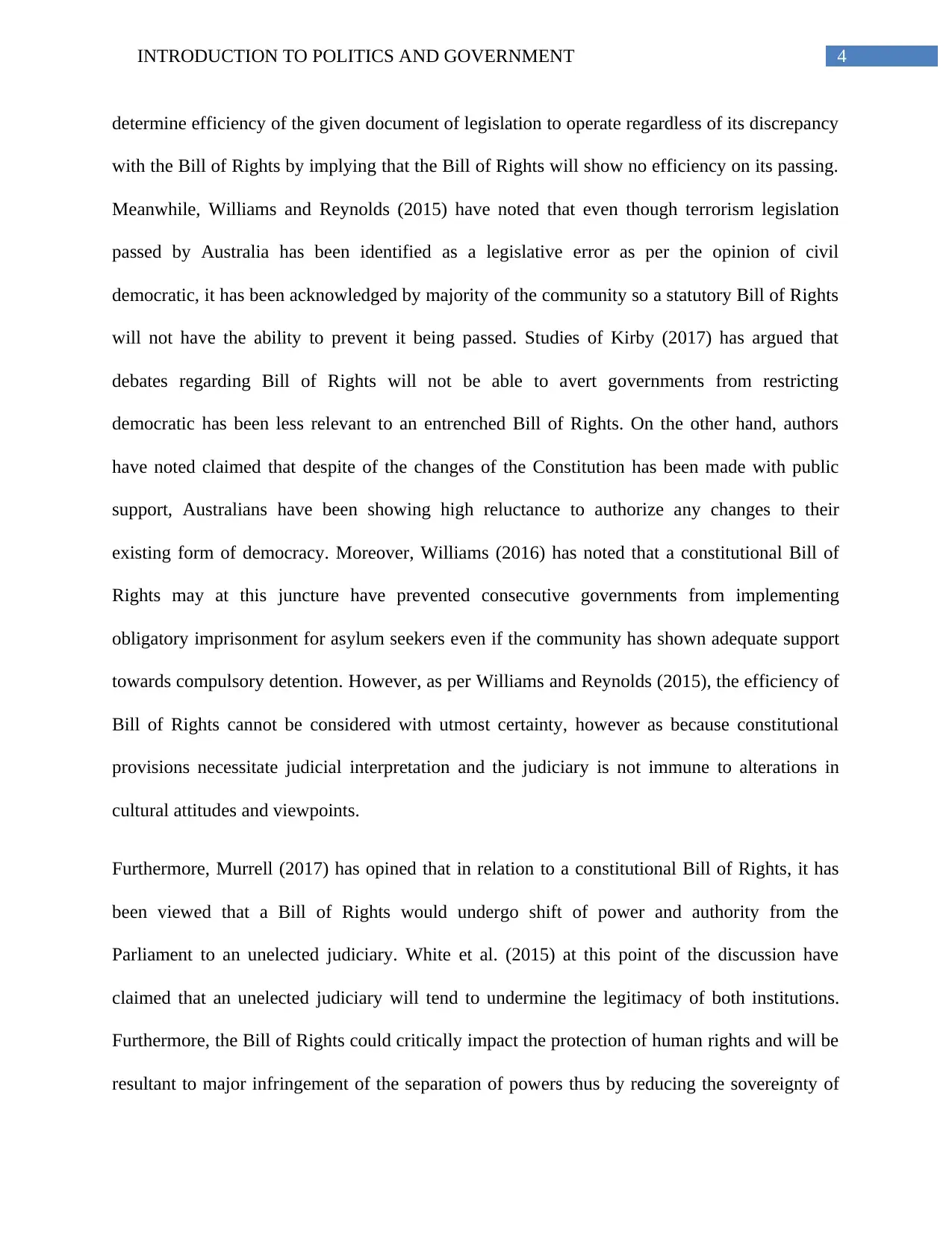
4INTRODUCTION TO POLITICS AND GOVERNMENT
determine efficiency of the given document of legislation to operate regardless of its discrepancy
with the Bill of Rights by implying that the Bill of Rights will show no efficiency on its passing.
Meanwhile, Williams and Reynolds (2015) have noted that even though terrorism legislation
passed by Australia has been identified as a legislative error as per the opinion of civil
democratic, it has been acknowledged by majority of the community so a statutory Bill of Rights
will not have the ability to prevent it being passed. Studies of Kirby (2017) has argued that
debates regarding Bill of Rights will not be able to avert governments from restricting
democratic has been less relevant to an entrenched Bill of Rights. On the other hand, authors
have noted claimed that despite of the changes of the Constitution has been made with public
support, Australians have been showing high reluctance to authorize any changes to their
existing form of democracy. Moreover, Williams (2016) has noted that a constitutional Bill of
Rights may at this juncture have prevented consecutive governments from implementing
obligatory imprisonment for asylum seekers even if the community has shown adequate support
towards compulsory detention. However, as per Williams and Reynolds (2015), the efficiency of
Bill of Rights cannot be considered with utmost certainty, however as because constitutional
provisions necessitate judicial interpretation and the judiciary is not immune to alterations in
cultural attitudes and viewpoints.
Furthermore, Murrell (2017) has opined that in relation to a constitutional Bill of Rights, it has
been viewed that a Bill of Rights would undergo shift of power and authority from the
Parliament to an unelected judiciary. White et al. (2015) at this point of the discussion have
claimed that an unelected judiciary will tend to undermine the legitimacy of both institutions.
Furthermore, the Bill of Rights could critically impact the protection of human rights and will be
resultant to major infringement of the separation of powers thus by reducing the sovereignty of
determine efficiency of the given document of legislation to operate regardless of its discrepancy
with the Bill of Rights by implying that the Bill of Rights will show no efficiency on its passing.
Meanwhile, Williams and Reynolds (2015) have noted that even though terrorism legislation
passed by Australia has been identified as a legislative error as per the opinion of civil
democratic, it has been acknowledged by majority of the community so a statutory Bill of Rights
will not have the ability to prevent it being passed. Studies of Kirby (2017) has argued that
debates regarding Bill of Rights will not be able to avert governments from restricting
democratic has been less relevant to an entrenched Bill of Rights. On the other hand, authors
have noted claimed that despite of the changes of the Constitution has been made with public
support, Australians have been showing high reluctance to authorize any changes to their
existing form of democracy. Moreover, Williams (2016) has noted that a constitutional Bill of
Rights may at this juncture have prevented consecutive governments from implementing
obligatory imprisonment for asylum seekers even if the community has shown adequate support
towards compulsory detention. However, as per Williams and Reynolds (2015), the efficiency of
Bill of Rights cannot be considered with utmost certainty, however as because constitutional
provisions necessitate judicial interpretation and the judiciary is not immune to alterations in
cultural attitudes and viewpoints.
Furthermore, Murrell (2017) has opined that in relation to a constitutional Bill of Rights, it has
been viewed that a Bill of Rights would undergo shift of power and authority from the
Parliament to an unelected judiciary. White et al. (2015) at this point of the discussion have
claimed that an unelected judiciary will tend to undermine the legitimacy of both institutions.
Furthermore, the Bill of Rights could critically impact the protection of human rights and will be
resultant to major infringement of the separation of powers thus by reducing the sovereignty of
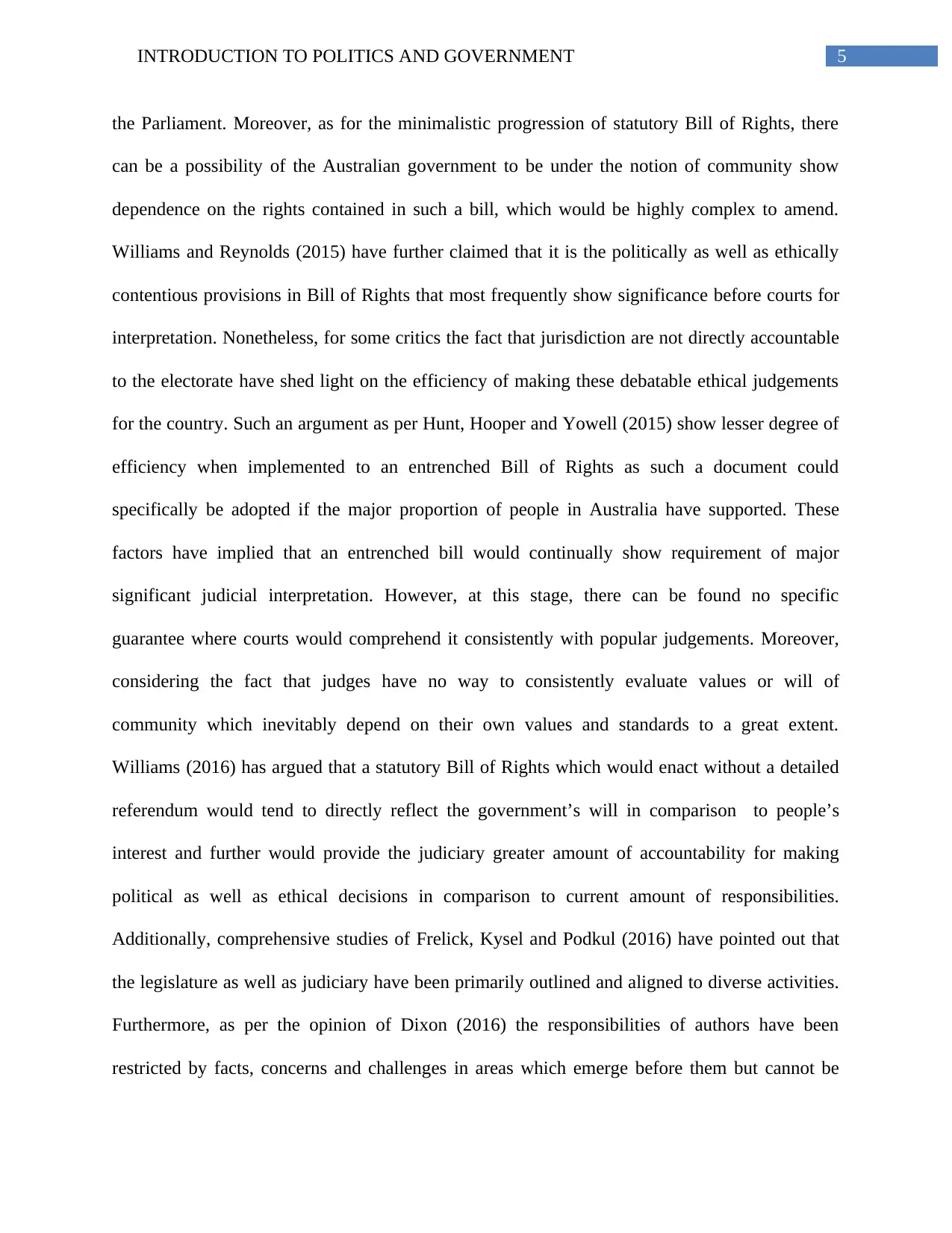
5INTRODUCTION TO POLITICS AND GOVERNMENT
the Parliament. Moreover, as for the minimalistic progression of statutory Bill of Rights, there
can be a possibility of the Australian government to be under the notion of community show
dependence on the rights contained in such a bill, which would be highly complex to amend.
Williams and Reynolds (2015) have further claimed that it is the politically as well as ethically
contentious provisions in Bill of Rights that most frequently show significance before courts for
interpretation. Nonetheless, for some critics the fact that jurisdiction are not directly accountable
to the electorate have shed light on the efficiency of making these debatable ethical judgements
for the country. Such an argument as per Hunt, Hooper and Yowell (2015) show lesser degree of
efficiency when implemented to an entrenched Bill of Rights as such a document could
specifically be adopted if the major proportion of people in Australia have supported. These
factors have implied that an entrenched bill would continually show requirement of major
significant judicial interpretation. However, at this stage, there can be found no specific
guarantee where courts would comprehend it consistently with popular judgements. Moreover,
considering the fact that judges have no way to consistently evaluate values or will of
community which inevitably depend on their own values and standards to a great extent.
Williams (2016) has argued that a statutory Bill of Rights which would enact without a detailed
referendum would tend to directly reflect the government’s will in comparison to people’s
interest and further would provide the judiciary greater amount of accountability for making
political as well as ethical decisions in comparison to current amount of responsibilities.
Additionally, comprehensive studies of Frelick, Kysel and Podkul (2016) have pointed out that
the legislature as well as judiciary have been primarily outlined and aligned to diverse activities.
Furthermore, as per the opinion of Dixon (2016) the responsibilities of authors have been
restricted by facts, concerns and challenges in areas which emerge before them but cannot be
the Parliament. Moreover, as for the minimalistic progression of statutory Bill of Rights, there
can be a possibility of the Australian government to be under the notion of community show
dependence on the rights contained in such a bill, which would be highly complex to amend.
Williams and Reynolds (2015) have further claimed that it is the politically as well as ethically
contentious provisions in Bill of Rights that most frequently show significance before courts for
interpretation. Nonetheless, for some critics the fact that jurisdiction are not directly accountable
to the electorate have shed light on the efficiency of making these debatable ethical judgements
for the country. Such an argument as per Hunt, Hooper and Yowell (2015) show lesser degree of
efficiency when implemented to an entrenched Bill of Rights as such a document could
specifically be adopted if the major proportion of people in Australia have supported. These
factors have implied that an entrenched bill would continually show requirement of major
significant judicial interpretation. However, at this stage, there can be found no specific
guarantee where courts would comprehend it consistently with popular judgements. Moreover,
considering the fact that judges have no way to consistently evaluate values or will of
community which inevitably depend on their own values and standards to a great extent.
Williams (2016) has argued that a statutory Bill of Rights which would enact without a detailed
referendum would tend to directly reflect the government’s will in comparison to people’s
interest and further would provide the judiciary greater amount of accountability for making
political as well as ethical decisions in comparison to current amount of responsibilities.
Additionally, comprehensive studies of Frelick, Kysel and Podkul (2016) have pointed out that
the legislature as well as judiciary have been primarily outlined and aligned to diverse activities.
Furthermore, as per the opinion of Dixon (2016) the responsibilities of authors have been
restricted by facts, concerns and challenges in areas which emerge before them but cannot be
⊘ This is a preview!⊘
Do you want full access?
Subscribe today to unlock all pages.

Trusted by 1+ million students worldwide
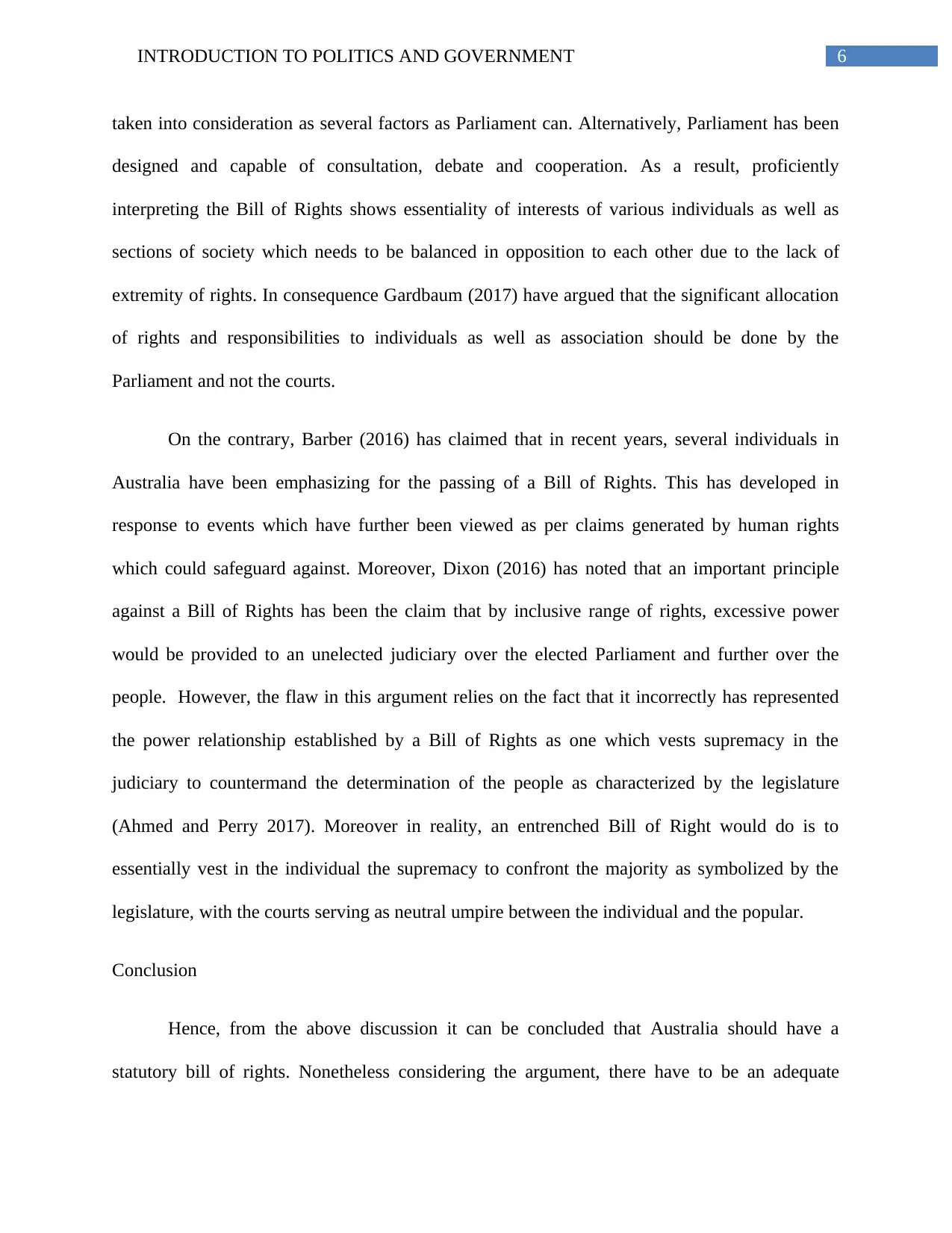
6INTRODUCTION TO POLITICS AND GOVERNMENT
taken into consideration as several factors as Parliament can. Alternatively, Parliament has been
designed and capable of consultation, debate and cooperation. As a result, proficiently
interpreting the Bill of Rights shows essentiality of interests of various individuals as well as
sections of society which needs to be balanced in opposition to each other due to the lack of
extremity of rights. In consequence Gardbaum (2017) have argued that the significant allocation
of rights and responsibilities to individuals as well as association should be done by the
Parliament and not the courts.
On the contrary, Barber (2016) has claimed that in recent years, several individuals in
Australia have been emphasizing for the passing of a Bill of Rights. This has developed in
response to events which have further been viewed as per claims generated by human rights
which could safeguard against. Moreover, Dixon (2016) has noted that an important principle
against a Bill of Rights has been the claim that by inclusive range of rights, excessive power
would be provided to an unelected judiciary over the elected Parliament and further over the
people. However, the flaw in this argument relies on the fact that it incorrectly has represented
the power relationship established by a Bill of Rights as one which vests supremacy in the
judiciary to countermand the determination of the people as characterized by the legislature
(Ahmed and Perry 2017). Moreover in reality, an entrenched Bill of Right would do is to
essentially vest in the individual the supremacy to confront the majority as symbolized by the
legislature, with the courts serving as neutral umpire between the individual and the popular.
Conclusion
Hence, from the above discussion it can be concluded that Australia should have a
statutory bill of rights. Nonetheless considering the argument, there have to be an adequate
taken into consideration as several factors as Parliament can. Alternatively, Parliament has been
designed and capable of consultation, debate and cooperation. As a result, proficiently
interpreting the Bill of Rights shows essentiality of interests of various individuals as well as
sections of society which needs to be balanced in opposition to each other due to the lack of
extremity of rights. In consequence Gardbaum (2017) have argued that the significant allocation
of rights and responsibilities to individuals as well as association should be done by the
Parliament and not the courts.
On the contrary, Barber (2016) has claimed that in recent years, several individuals in
Australia have been emphasizing for the passing of a Bill of Rights. This has developed in
response to events which have further been viewed as per claims generated by human rights
which could safeguard against. Moreover, Dixon (2016) has noted that an important principle
against a Bill of Rights has been the claim that by inclusive range of rights, excessive power
would be provided to an unelected judiciary over the elected Parliament and further over the
people. However, the flaw in this argument relies on the fact that it incorrectly has represented
the power relationship established by a Bill of Rights as one which vests supremacy in the
judiciary to countermand the determination of the people as characterized by the legislature
(Ahmed and Perry 2017). Moreover in reality, an entrenched Bill of Right would do is to
essentially vest in the individual the supremacy to confront the majority as symbolized by the
legislature, with the courts serving as neutral umpire between the individual and the popular.
Conclusion
Hence, from the above discussion it can be concluded that Australia should have a
statutory bill of rights. Nonetheless considering the argument, there have to be an adequate
Paraphrase This Document
Need a fresh take? Get an instant paraphrase of this document with our AI Paraphraser
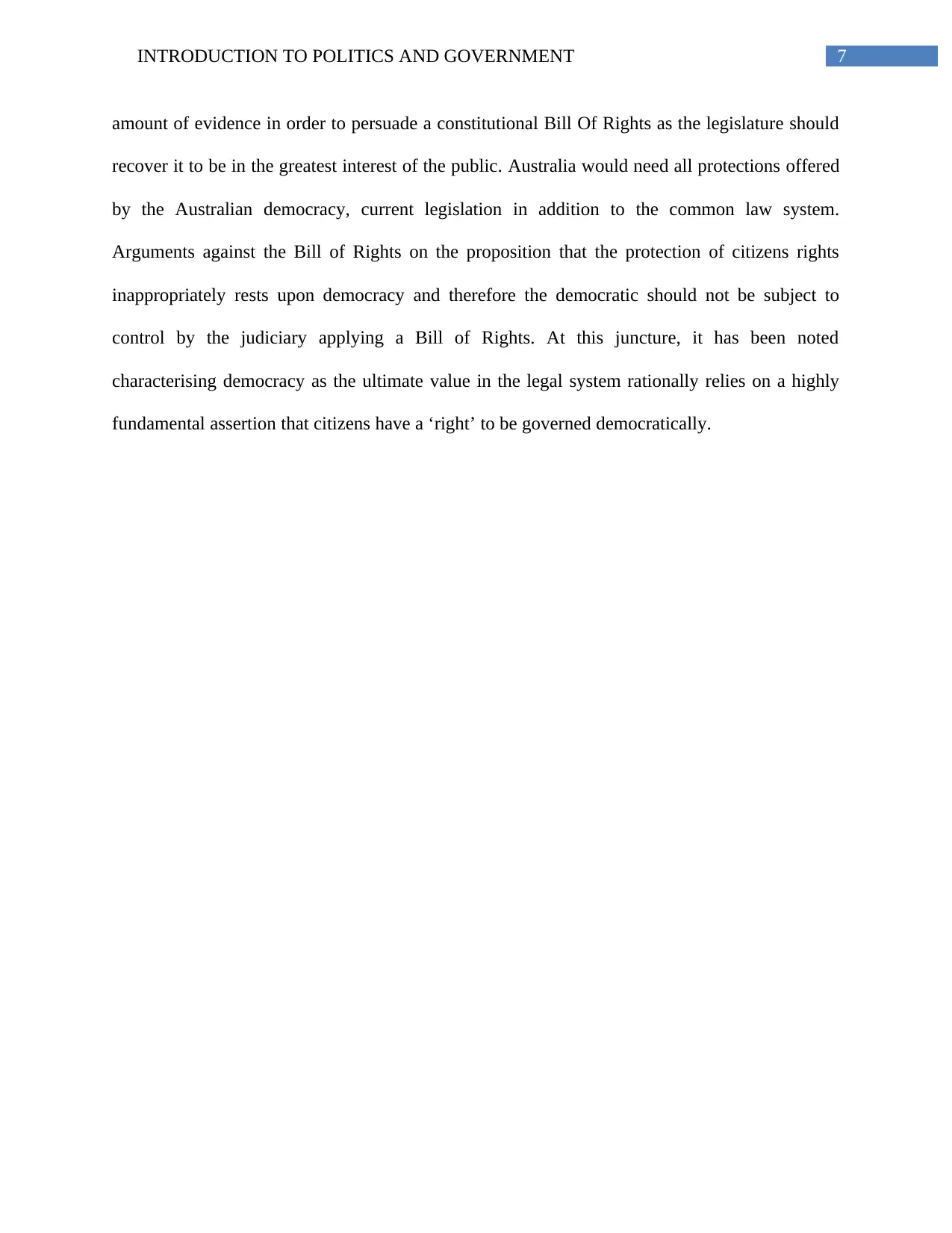
7INTRODUCTION TO POLITICS AND GOVERNMENT
amount of evidence in order to persuade a constitutional Bill Of Rights as the legislature should
recover it to be in the greatest interest of the public. Australia would need all protections offered
by the Australian democracy, current legislation in addition to the common law system.
Arguments against the Bill of Rights on the proposition that the protection of citizens rights
inappropriately rests upon democracy and therefore the democratic should not be subject to
control by the judiciary applying a Bill of Rights. At this juncture, it has been noted
characterising democracy as the ultimate value in the legal system rationally relies on a highly
fundamental assertion that citizens have a ‘right’ to be governed democratically.
amount of evidence in order to persuade a constitutional Bill Of Rights as the legislature should
recover it to be in the greatest interest of the public. Australia would need all protections offered
by the Australian democracy, current legislation in addition to the common law system.
Arguments against the Bill of Rights on the proposition that the protection of citizens rights
inappropriately rests upon democracy and therefore the democratic should not be subject to
control by the judiciary applying a Bill of Rights. At this juncture, it has been noted
characterising democracy as the ultimate value in the legal system rationally relies on a highly
fundamental assertion that citizens have a ‘right’ to be governed democratically.
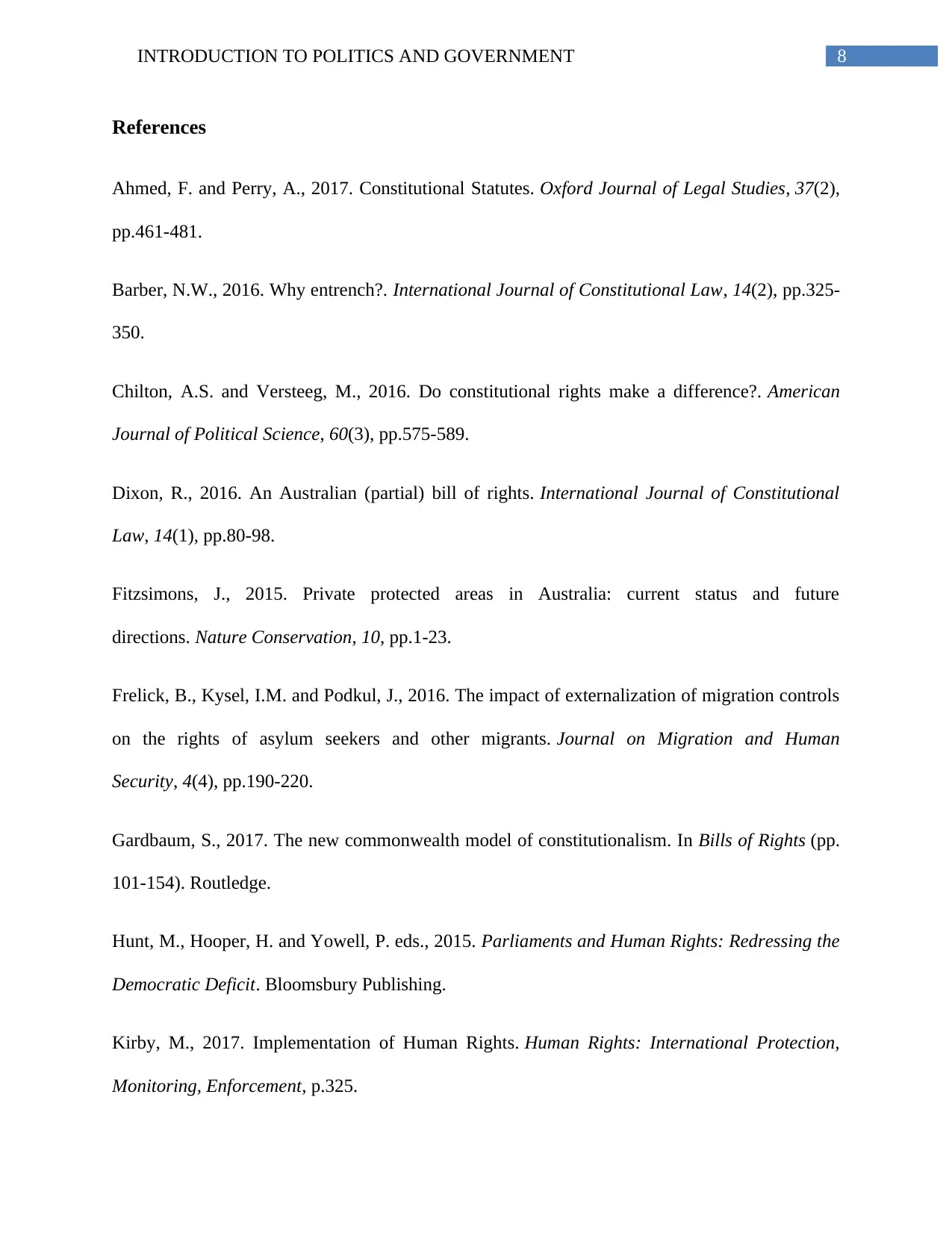
8INTRODUCTION TO POLITICS AND GOVERNMENT
References
Ahmed, F. and Perry, A., 2017. Constitutional Statutes. Oxford Journal of Legal Studies, 37(2),
pp.461-481.
Barber, N.W., 2016. Why entrench?. International Journal of Constitutional Law, 14(2), pp.325-
350.
Chilton, A.S. and Versteeg, M., 2016. Do constitutional rights make a difference?. American
Journal of Political Science, 60(3), pp.575-589.
Dixon, R., 2016. An Australian (partial) bill of rights. International Journal of Constitutional
Law, 14(1), pp.80-98.
Fitzsimons, J., 2015. Private protected areas in Australia: current status and future
directions. Nature Conservation, 10, pp.1-23.
Frelick, B., Kysel, I.M. and Podkul, J., 2016. The impact of externalization of migration controls
on the rights of asylum seekers and other migrants. Journal on Migration and Human
Security, 4(4), pp.190-220.
Gardbaum, S., 2017. The new commonwealth model of constitutionalism. In Bills of Rights (pp.
101-154). Routledge.
Hunt, M., Hooper, H. and Yowell, P. eds., 2015. Parliaments and Human Rights: Redressing the
Democratic Deficit. Bloomsbury Publishing.
Kirby, M., 2017. Implementation of Human Rights. Human Rights: International Protection,
Monitoring, Enforcement, p.325.
References
Ahmed, F. and Perry, A., 2017. Constitutional Statutes. Oxford Journal of Legal Studies, 37(2),
pp.461-481.
Barber, N.W., 2016. Why entrench?. International Journal of Constitutional Law, 14(2), pp.325-
350.
Chilton, A.S. and Versteeg, M., 2016. Do constitutional rights make a difference?. American
Journal of Political Science, 60(3), pp.575-589.
Dixon, R., 2016. An Australian (partial) bill of rights. International Journal of Constitutional
Law, 14(1), pp.80-98.
Fitzsimons, J., 2015. Private protected areas in Australia: current status and future
directions. Nature Conservation, 10, pp.1-23.
Frelick, B., Kysel, I.M. and Podkul, J., 2016. The impact of externalization of migration controls
on the rights of asylum seekers and other migrants. Journal on Migration and Human
Security, 4(4), pp.190-220.
Gardbaum, S., 2017. The new commonwealth model of constitutionalism. In Bills of Rights (pp.
101-154). Routledge.
Hunt, M., Hooper, H. and Yowell, P. eds., 2015. Parliaments and Human Rights: Redressing the
Democratic Deficit. Bloomsbury Publishing.
Kirby, M., 2017. Implementation of Human Rights. Human Rights: International Protection,
Monitoring, Enforcement, p.325.
⊘ This is a preview!⊘
Do you want full access?
Subscribe today to unlock all pages.

Trusted by 1+ million students worldwide
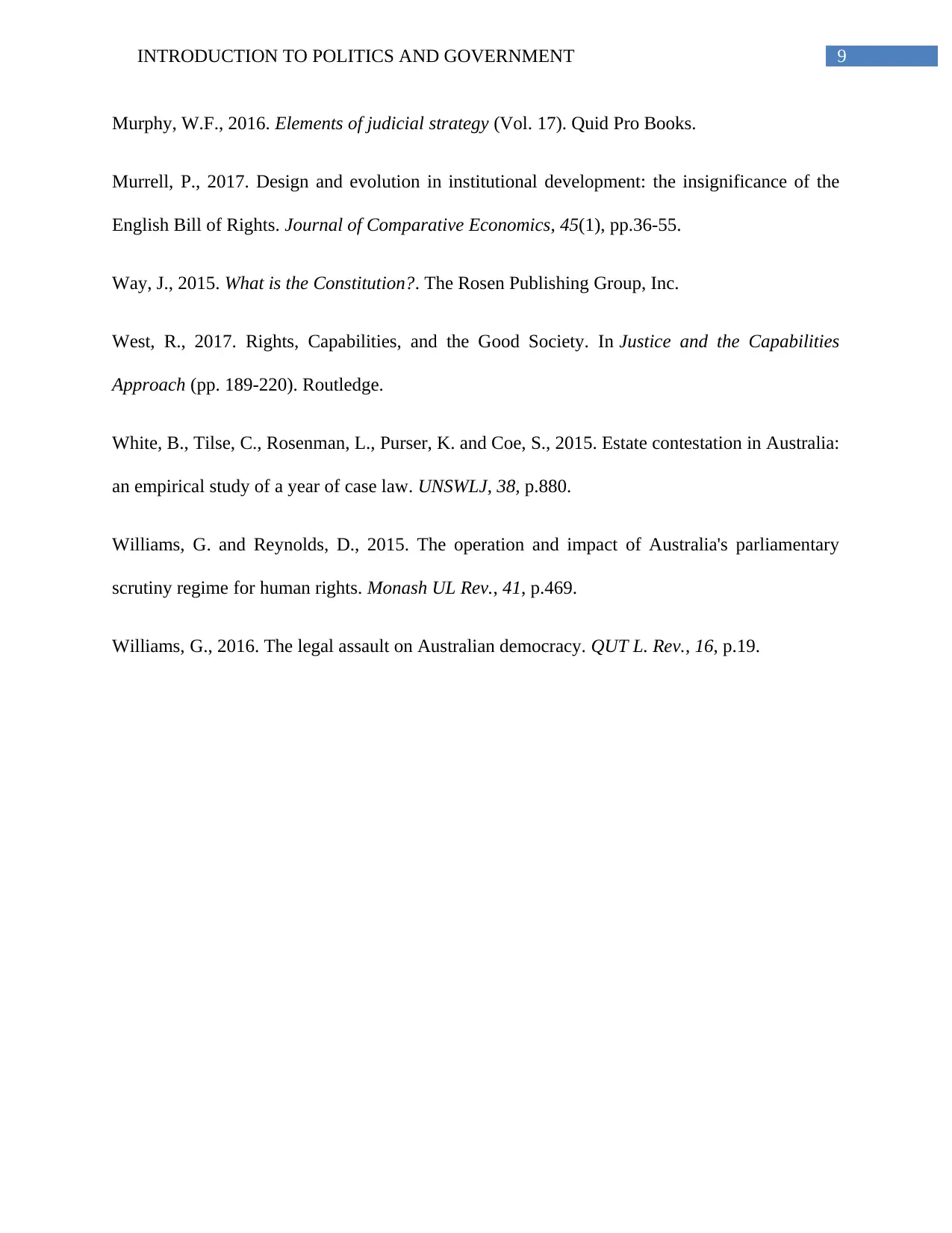
9INTRODUCTION TO POLITICS AND GOVERNMENT
Murphy, W.F., 2016. Elements of judicial strategy (Vol. 17). Quid Pro Books.
Murrell, P., 2017. Design and evolution in institutional development: the insignificance of the
English Bill of Rights. Journal of Comparative Economics, 45(1), pp.36-55.
Way, J., 2015. What is the Constitution?. The Rosen Publishing Group, Inc.
West, R., 2017. Rights, Capabilities, and the Good Society. In Justice and the Capabilities
Approach (pp. 189-220). Routledge.
White, B., Tilse, C., Rosenman, L., Purser, K. and Coe, S., 2015. Estate contestation in Australia:
an empirical study of a year of case law. UNSWLJ, 38, p.880.
Williams, G. and Reynolds, D., 2015. The operation and impact of Australia's parliamentary
scrutiny regime for human rights. Monash UL Rev., 41, p.469.
Williams, G., 2016. The legal assault on Australian democracy. QUT L. Rev., 16, p.19.
Murphy, W.F., 2016. Elements of judicial strategy (Vol. 17). Quid Pro Books.
Murrell, P., 2017. Design and evolution in institutional development: the insignificance of the
English Bill of Rights. Journal of Comparative Economics, 45(1), pp.36-55.
Way, J., 2015. What is the Constitution?. The Rosen Publishing Group, Inc.
West, R., 2017. Rights, Capabilities, and the Good Society. In Justice and the Capabilities
Approach (pp. 189-220). Routledge.
White, B., Tilse, C., Rosenman, L., Purser, K. and Coe, S., 2015. Estate contestation in Australia:
an empirical study of a year of case law. UNSWLJ, 38, p.880.
Williams, G. and Reynolds, D., 2015. The operation and impact of Australia's parliamentary
scrutiny regime for human rights. Monash UL Rev., 41, p.469.
Williams, G., 2016. The legal assault on Australian democracy. QUT L. Rev., 16, p.19.
1 out of 10
Related Documents
Your All-in-One AI-Powered Toolkit for Academic Success.
+13062052269
info@desklib.com
Available 24*7 on WhatsApp / Email
![[object Object]](/_next/static/media/star-bottom.7253800d.svg)
Unlock your academic potential
Copyright © 2020–2026 A2Z Services. All Rights Reserved. Developed and managed by ZUCOL.





